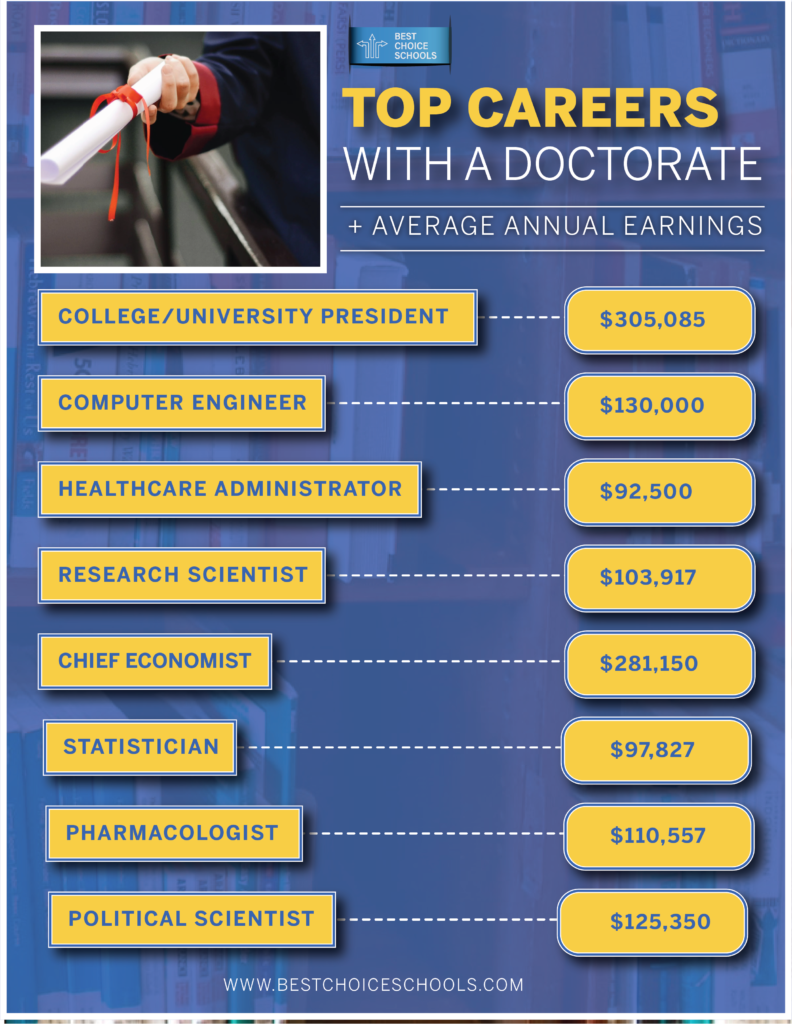
A doctoral degree has shown to be a path towards a higher income and a way of standing out in your field of choice. Evidence suggests more people are discovering this fact, as well. According to the United States Census Bureau, as of 2018, 4.5 million Americans had obtained a Ph.D. This is up from what was just two million in 2000.
While more Americans are discovering the career options and breakout potential made possible by higher education, others are asking, “What can a doctorate do for me? What careers are out there which require this highest type of education to excel?”
Why Get a Doctorate Degree?
Ph.D. programs are known for being a difficult journey. It takes a lot of work and effort to get the knowledge necessary to earn that diploma and title. However, this work is for more than just a piece of paper and a paycheck. There are plenty of mental and social benefits to getting your doctorate, too.
Learn How to Find Answers
A major aspect of getting a Ph.D. is the dissertation or the original research or piece you create as part of the curriculum. Because the dissertation is completely novel, it means that part of your education will be learning how to find questions and the answers to those questions. You can’t create something new without knowing where the gaps in current knowledge are.
Learn to Create Information
Once you know where the gaps are, you can start to fill them in with your research. You’ll design experiments, craft surveys, or work on designs that will lead you towards your dissertation’s end goal.
This practice of creating your own procedures and tests will teach you how to generate information from the world around you rather than just repeat what you hear. You’ll learn how to discover answers from data and reasoning along this journey to your doctorate.
Overcome a Fear of Failure
No Ph.D. candidate gets through their dissertation without some setbacks. The process of creating new knowledge involves a lot of reworking of designs and confirmation of results.
While most people will feel these to be failures, a doctoral program will show that these are just steps you have to take to find what you’re looking for. This prepares you for the work you’ll be doing on the job, where the problems you’ll encounter don’t always have a cut and dry answer.
Qualify For Any Positions in Your Field
The main benefit of a doctoral degree is that you’ll qualify for any position in your field. While someone that holds a bachelor’s or master’s degree can only claim so much expertise, a Ph.D. commands the most, thanks to their full immersion in the subject matter. This expertise gives you the ability to walk to any position in your field and understand and adapt to the challenges presented at that job.
How to Obtain a Doctorate Degree

Doctorate degrees are the most difficult degree to obtain for two reasons: the time commitment and the creation of a dissertation. However, before you get to this point, you must first complete your bachelor’s and master’s degrees.
Although not everyone goes to graduate school for a master’s degree before getting a Ph.D., the information you learn from a master’s degree can go a long way. Also, most people will pursue a doctorate program relevant to their initial degree because they’re already acquired the background knowledge and skills to succeed as a Ph.D. candidate.
A Ph.D. candidate will most likely spend three to five years on their dissertation, alongside any courses they have to complete for their college or university’s curriculum. This time, when paired with the credit hour price for many graduate programs, filters a large number of people out of the program preemptively.
Once you’re in a Ph.D. program, the dissertation will be the main factor in determining your graduation. You’ll have a dissertation committee made up of professors and experts at the university related to the field you’re studying. This committee will decide if your dissertation is progressing at a good pace and if your dissertation is worthy of being granted the degree when you complete it.
Once you complete your dissertation and the coursework for your degree, you’re now officially a doctorate of your field of choice and have a wealth of options for careers after graduate school.
Career Paths for Doctorate Degree Holders

Getting a doctorate opens you up to some of the highest positions out there today, particularly in the field you are studying in. Here are some of the top career paths to pursue once you have earned your doctorate degree.
Related resource: 20 Best Online Schools for Doctorate Degrees
Top Careers with a Doctorate Plus Average Annual Earnings

College/University President
A college or university president is the leader of a higher educational institution. It’s their job to ensure that the students of the university or college receive the best education that they can and that their faculty and staff are providing that education sensibly and effectively.
The Degree Needed To Be A College/University President
Most college/university presidents earn a Doctorate in Education (EdD), with an emphasis on Education Leadership. Forbes has also found that roughly 10 percent of college presidents have had a Ph.D. in economics, offering another road into this career.
Most EdD earners will start with an education bachelor’s degree, although this isn’t necessarily required. Economics, social science degrees, and other similar majors can all provide the background needed to succeed in the education leadership space.
What Career Path To Follow For A College/University President?
Many presidents get their start after their Ph.D. as full-time college faculty. Although some presidents find their way to this career by taking jobs outside of the education sector first, about 70 percent of college presidents started as a professor or dean after getting their degree. Education tends to have fewer restrictions on who enters the field, as it takes all kinds of experts to teach students effectively.
Average Salary For A College/University President
The average salary for this position in the United States is $304,085, but the salary can range from $164,000 to $530,000, depending on which college or university you’re at.
Computer Engineer
Computer engineers are the scientists and designers behind breakthroughs in computer hardware and software. They will design and test new hardware components or write software that will solve a problem or automate a task.
The Degree Needed to Be a Computer Engineer
Almost all computer engineers receive a Ph.D. in computer science or computer engineering. Given that computer science is a highly technical field, having a dedicated degree in that field goes far in gaining expertise on the subject.
Most computer engineers also start their higher education with a bachelor’s in computer science or computer engineering. This degree gives you the foundational understanding of computer systems, hardware, and software, while a Ph.D. will provide you with the tools to design new systems and lead development teams.
What Career Path to Follow for a Computer Engineer?
After getting their doctorate, computer engineers tend towards either a managerial or development role in their field. A managerial focus will lead towards careers such as chief information officer or chief technology officer for major companies. In contrast, a development focus will lead to heading a research and development team in a computer lab.
Either of these focuses tends to be available right after graduating with your degree, assuming your focus lines up with the position.
Average Salary for a Computer Engineer
The average salary for a Ph.D. in computer engineering is $130,000. This number can vary depending on if you enter academia or the professional world, with academia usually paying a little less.
Healthcare Administrator
Healthcare administrators are clinical leaders in the healthcare space. Their job is to ensure that effective clinical practices are being implemented in their employment practice, including scheduling staff and keeping pace with health law and regulations.
The Degree Needed to Be a Healthcare Administrator
Health administrators have a specialized doctoral program for them: the Ph.D. of Healthcare Administration. This degree teaches healthcare-focused leadership skills and regulatory and other information needed to lead a healthcare team.
Many healthcare administrators get their start with a bachelor’s in healthcare administration or public health. These degrees provide the baseline knowledge you need to succeed in the health administration doctorate program. Some healthcare administrators will start with nursing or medical science degrees, as well.
What Career Path to Follow for a Healthcare Administrator?
Many healthcare administrators will find work as a health information manager or a clinical manager. These jobs put you as the head of one facet of the healthcare space, such as medical records or hospital practices. Some healthcare admins work as generalists in the administrative space, filling gaps in their work as needed.
Average Salary for a Healthcare Administrator
The average salary for a Ph.D. in healthcare administrator is $92,500, but this average has a wide range. This is because not all jobs that a healthcare administrator can fill are equal, so the pay will vary depending on what kind of practice you are hired into and what roles you have to fill on the job.
Research Scientist
Research scientists use the scientific method to solve problems or answer questions in a specific field of science. They work with data and observation to determine these answers and develop trials and experiments to generate this data.
The Degree Needed To Be A Research Scientist Roles
The degree choice for research science depends on what field of science you want to go into. There are many fields of science, such as natural science like biology, chemistry, physics, or social sciences like psychology and sociology. Regardless of which field you pursue, you will usually select a doctoral program that features that field of your choice (i.e., a Ph.D. in Chemistry to become a chemistry research scientist).
A bachelor’s degree in the field you want to research in will help, as well. This bachelor’s degree, or a degree in a related field, will give you the basics for research and procedure development that you’ll use later on in your career and your Ph.D. program.
What Career Path to Follow for a Research Scientist?
For most research scientists, you’ll work in a role that is exactly that: research. While this research could be done by a professor or university fellow, in a private company’s R&D lab, or a government lab, a research scientist will work with a team to develop and test new ways of making products or solving problems.
Average Salary for a Research Scientist
The average salary for a research scientist with a Ph.D. is $103,917. This value can vary depending on which field of science you study and where you are employed, but most research scientists with a Ph.D. end up around this average value.
Chief Economist
Chief economists fill the role of a financial advisor and senior executive within a company or organization. Their job is to lend their understanding of economics, commerce, and finance to help where they work to make better decisions with money.
The Degree Needed To Be A Chief Economist
Many chief economists earn a Ph.D. in Economics for their doctorate. This degree covers the various fields of economics, including microeconomics, macroeconomics, and resource economics.
Although a bachelor’s degree in economics is the most straightforward way to this doctoral program, a background in business or finance can also prepare for a Ph.D. in economics.
What Career Path to Follow for a Chief Economist?
Chief economists will tend towards advisory and leadership roles within a company’s financial team. They communicate with the various other departments in the organization to find the most efficient ways to use the company’s assets and analyze how the company does year after year to make sure that the company is able to grow.
Average Salary for a Chief Economist
Chief economists with a Ph.D. have an average salary of $281,150. This salary range is somewhat wide as not all positions a chief economist can fill are equally paid, resulting in the gap in earnings seen by this role.
Other great careers
The doctorate careers listed above aren’t the only options available for Ph.D. perspectives. Here’s a list of some other Ph.D. careers where a doctorate can go a long way:
- Statistician – With a Ph.D. in Statistics, you could work for many surveying and data collection agencies to look for trends and correlations.
- Pharmacologist – A Ph.D. in Pharmacology, the academic study of pharmaceuticals and medicine, would let you lead research teams in developing new medicines for the public to use.
- Political Scientist – A Ph.D. in Political Science gives you an in-depth understanding of governmental systems and structures and how best to optimize those systems to benefit a nation or state.
Summary
A Ph.D. can go a long way in improving your annual earnings and improving your standing as a professional in the field. Although they are extremely rigorous and take a lot of hard work, a Ph.D. is a surefire way to a leadership position in a field you are passionate about. Look over some Ph.D. programs that you might qualify to apply for and see what opportunities could be out there for you to seize.
Related Articles:
20 Best Online Schools for Doctorate Degrees




